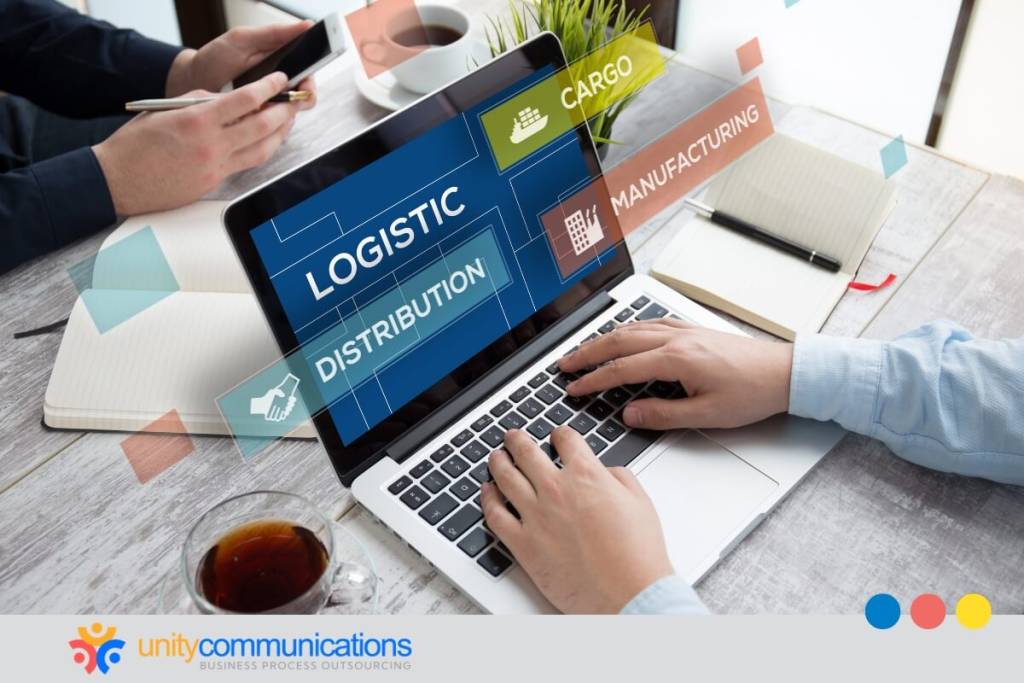Table of Contents
Technology is crucial in logistics business process outsourcing (BPO). It bridges operational gaps, facilitates real-time coordination, and empowers providers to meet rising service expectations quickly and accurately.
It also has different types. Which suits your company’s needs and goals?
This article explores the pivotal role of technology in enhancing outsourced logistics operations. It enumerates essential applications that drive efficiency, end-to-end visibility, and growth. It also discusses the importance of compliance and data security when using these platforms.
Read below to learn more!
4 essential technology tools in outsourced logistics operations

The global logistics outsourcing industry has grown significantly as companies rely on experts to manage complex supply chain operations. According to Precedence Research, the global third-party logistics (3PL) market could hit $2.09 trillion in 2034 from $1.32 trillion in 2024.
Technology partly fuels its demand. It streamlines supply chains, accelerates decision-making, lowers operating costs, and simplifies outsourcing. Examples include these four popular logistics platforms:
1. Transportation management system (TMS) for optimized shipping
TMS streamlines how the third-party BPO manages the transportation of goods. One primary benefit is optimizing routes to determine the cost-effective shipment paths. This leads to reduced fuel consumption, shorter transit times, and lower transportation costs.
Another key advantage is real-time shipment visibility. Modern systems provide end-to-end tracking. With transparency, you can proactively address delays and disruptions.
TMS platforms also support carrier management. Providers can evaluate rates, performance, and capacity across multiple carriers for optimal service. They automate tasks, such as customs paperwork and freight audits, to reduce administrative burden and ensure adherence to regional regulations.
As a crucial technology in outsourced logistics operations, TMS uses data to spot trends, boost service, and plan. These cloud-based platforms are also scalable. They grow with your needs and integrate seamlessly with other systems.
2. Warehouse management system (WMS) for inventory control
A WMS automates inventory tracking through barcode scanning, radiofrequency identification (RFID), and real-time data capture. This approach minimizes human error and keeps inventory levels up-to-date. As a result, you benefit from reduced risk of stockouts, overstocking, and fulfillment delays. These are all critical factors in maintaining service levels and customer satisfaction.
WMS also enhances order fulfillment speed and accuracy. It streamlines picking, packing, and shipping by assigning tasks based on product location, order priority, and worker availability. The results are faster turnaround times, reduced labor costs, and lower returns due to errors.
Another key advantage is space utilization and layout optimization. A WMS helps your provider maximize available warehouse space by:
- Suggesting optimal storage locations based on product characteristics and demand patterns
- Reducing wasted space by consolidating partial pallets and guiding efficient slotting
- Balancing inventory distribution to avoid congestion in high-traffic zones
- Supporting dynamic re-slotting as demand shifts
- Optimizing picking paths by arranging items to minimize travel time for workers
With this platform, you can improve operational flow and manage increased demand without physical expansion.
Strategically, a WMS gives real-time visibility into inventory and orders. This transparency strengthens trust and collaboration between your team and the BPO company.
3. Predictive analytics for demand forecasting and inventory management
Another key technology in outsourced logistics is predictive analytics. It uses historical data, market trends, seasonal patterns, and real-time inputs to accurately anticipate demand.
With more precise forecasts, you can better manage warehouse space and stock the right products in the right amounts. This reduces carrying costs and minimizes waste, especially for perishable or time-sensitive goods.
In addition, predictive analytics supports labor and resource planning. Anticipating busy periods helps you adjust staffing, allocate equipment, and streamline workflows to stay productive without extra costs. For instance:
- WMS predicts a 30% spike in orders during the holiday season.
- Managers schedule additional staff for peak picking hours while reducing shifts during slower periods.
- To prevent bottlenecks, forklifts and packing stations are pre-assigned to high-demand zones.
- As a result, orders are fulfilled on time without hiring temporary workers or renting extra equipment.
Predictive analytics shorten response times, improve service levels, and boost customer satisfaction. Forward-looking insights also keep teams aligned.
4. Internet of things (IoT) for real-time data collection and monitoring
IoT allows providers to monitor assets, track shipments, and instantly capture environmental conditions for unprecedented visibility and control:
- Sensors track location, temperature, humidity, and vibration to keep sensitive products under optimal conditions. This is crucial in pharmaceuticals, food, and electronics. Any deviation risks spoilage, damage, or compliance problems.
- IoT supports predictive maintenance and fleet management. Logistics providers can anticipate failures by collecting data from vehicles and equipment. This reduces downtime, extends asset life, improves service reliability, and reduces operating costs.
- The technology enhances security and loss prevention. IoT-enabled tracking can detect unauthorized access or route deviations in real time. This prevents theft, tampering, or loss, especially important for high-value or regulated goods.
Finally, IoT helps solve the problem of data management. Maintaining inaccurate or outdated data leads to delays, misplaced shipments, and poor decision-making. It is also expensive, costing companies around $12.9 million annually.
IoT automates data updates to reduce manual inputs. For example, sensors can immediately update inventory counts as shipments arrive, preventing stock discrepancies and costly reorders.
Maintaining data security and compliance in technology-driven logistics outsourcing

As you increasingly rely on technology in outsourced logistics operations, vast amounts of sensitive data flow between you and the provider. This makes data security and compliance more critical than ever.
The first step is to conduct thorough due diligence when selecting a BPO partner. Evaluate their cybersecurity measures, compliance certifications, and data protection track record.
Because compliance is a shared responsibility, you must provide accurate, necessary information and determine whether the provider has handled it appropriately. Ongoing oversight is key. Request audit reports, participate in security reviews, and regularly assess risks together.
Just as importantly, secure your systems, especially those integrated with the provider’s platforms, through strong access controls and employee training.
What’s the role of the BPO provider? They must implement robust cybersecurity measures to protect data from breaches, unauthorized access, and misuse, including:
- Firewalls
- Intrusion detection systems
- Encryption protocols
- Secure APIs
- Multi-factor authentication
Your logistics providers must comply with relevant data protection regulations, such as the General Data Protection Regulation (GDPR) and California Consumer Privacy Act (CCPA). They should also have technical safeguards and organizational policies regarding data access, storage, and processing.
Their roles extend to regular security audits and risk assessments to identify vulnerabilities and update protocols as threats evolve. Many leading BPO companies invest in employee cybersecurity training and establish incident response plans to promptly manage and report data breaches.
The bottom line
Today, many platforms can support your supply chain BPO strategy. The key is selecting the right technology for outsourced logistics operations.
It starts with understanding your needs and goals. Focus on solutions that drive efficiency, inventory control, route optimization, and real-time visibility. Prioritize scalable platforms that integrate easily with your systems.
To get the most value, partner with a technology-driven BPO provider that can guide implementation and deliver ongoing innovation. Let’s connect to explore how we can strengthen your logistics operations and position your business for long-term success.



